Known primarily as the guitarist/vocalist of the legendary Anacrusis, Kenn Nardi recently issued his first solo outing—a massive double-CD titled Dancing With the Past—through Divebomb Records. Containing 28 tracks and over two-and-a-half hours of diverse and intelligent metal, Dancing With the Past is a strikingly cohesive follow-up to where Anacrusis left off in 1993 with the mighty Screams and Whispers. If for some reason you've yet to give Nardi's solo debut a spin: trust me, it's fantastic. So, if nothing else, stream it via Bandcamp or Spotify—but better still, pick up the 2xCD while you still can!
I was more than a little excited to pick his brain about music and more, so huge thanks to Kenn for both his time and his openness. Keep up with Kenn's latest activities and all sorts of archival goodies via Facebook, YouTube, and anacrusis.us.

Dancing With the Past is such a massive project. After years of incredibly hard work, how does it feel to finally have the double-album complete and being positively received by the fans? (Congratulations, by the way!) I hope it's a proud relief!
Thanks. It is definitely nice to have such a great response to the album. I really wanted to make something special with this release, and I think the fans appreciate the amount of time and effort I put into it.
How did you hook up with Divebomb Records to release the album? Did that relationship just carry over from their reissue of the Hindsight collection a few years ago?
Yes, I've known Matt for a few years now, and Divebomb did do the second pressing of Hindsight. I wanted to be able to have a more efficient way to make the album available to as many people as possible without dealing with a label in the usual sense. I basically delivered the finished product to them and they took it from there.
I really tried to sit down with Dancing With the Past without any preconceived expectations as to what I would hear. As a result, I was somewhat surprised to discover that I really felt like I was more or less listening to Anacrusis. A number of tracks—"Fragile," "Made," "Blinding Lies," "Blood in the Water," etc.—absolutely feel like a logical follow-up to Screams and Whispers.
Well, that makes perfect sense, as much of the material was written for what was going to be a new "Anacrusis" album. I knew fans would expect certain elements that were trademarks of the band's sound, and so the mood and atmosphere I was going for were something I thought fans would expect if we had picked things up after Screams and Whispers and then carried on in a slightly different direction.
I read that some of these compositions have roots dating all the way back to 1994. I'm curious which tracks those might be?
There are really only two songs that go back to those old demos: "The Telling Skies" and "Beside Myself." The latter was re-worked without any orchestration and with a different middle part, which was only written recently.
In other interviews over the past year or so, I've been impressed by your up-front honesty regarding the fact that the material that ultimately made up Dancing With the Past was essentially driven by your own individual vision—while at the same time being respectful of former Anacrusis members' contributions to that band's legacy. Did that level of respect for your ex-bandmates factor into your decision to release Dancing With the Past under your own name?
The decision was almost entirely out of respect to them (and to our fans). To even release a new album with 3/4 of the original lineup under that name felt a little odd, since Kevin Heidbreder was not only a founding member, but also wrote music and lyrics for all of our albums. Once it was only me, I didn't give much thought to it at all. Almost everyone told me I should release it as an Anacrusis album, since it would get so much more attention, but I would never have felt right doing that. Aside from that, I also wanted to stretch out a bit more, creatively speaking, and did not want to be limited to what people consider "Anacrusis" music.
Did you worry at all that—had you released this material as Anacrusis—there might have been unfair criticism or unrealistic expectations clouding the reception of the album as a whole?
Sure. It's an impossible position to be in. Had I released it under the band's name there would have been people who would say, "This is not really an Anacrusis album," just like there are those who say it is an Anacrusis album even under my name. You just cannot win in that situation, so I did what I thought was the right thing, and I know I will never regret that.
Going through the documentation on the Anacrusis website, it's clear that you have a very caring and attuned connection to the intricacies of your music—having reworked songs using alternate tunings, re-recorded tracks in synth-based formats, etc. What does your writing process look like? Do you start with a riff? Lyrics? Does a near-complete framework take shape, with textures and nuances blended in until it just feels "complete"?
It has completely changed over the years. Different things have caused me to do things different ways depending on the situation. In the early days of the band, I would write riffs mainly, or even take pieces of music that came from us all jamming together, and assemble songs. On the other hand, about half of the time I wrote alone, though it was still beginning with a riff or two and building a song around that. Sometimes I'd have John or Kevin's lyrics to try and cram into a song, but with my own songs I always wrote the lyrics last and patterned them after the melodies and arrangements.
Around the time we were doing Manic Impressions, I began to write with a drum machine, which was a great and easy way to try many ideas. This was similar on the last album as well. I usually wrote the basslines also, unless there were specific bass parts that John wrote, like in "Idle Hours" or "My Soul's Affliction."
Later, when I wrote the Cruel April material, I would write the entire song on acoustic guitar and then layer the instruments however I thought the song dictated, with the lyrics coming last to fill in the melodies.
For Dancing With the Past, it was a combination of all of those styles. I wrote some riffs while jamming with our drummer, Mike Owen, and others at home with programmed drums. I tend to hear the song "finished" in my head from the beginning, and so it is actually easier for me to work alone these days as far as the final arrangement and recording are concerned.
Some of the new material is significantly more synth-heavy ("Straining the Frayed") or "experimental" ("Submerged"). What tends to dictate the level of "orchestration" or layering in any given track?
Whatever I think the song needs. "Submerged" was a song that was written around that hypnotic acoustic guitar plucking arrangement. Then came the syncopated bassline, and then the rest. I don't know where that song really came from, and I couldn't even classify the style exactly, but everyone I know loves it, so I included it even if it is a bit more out of place than most of the other songs. I'd love to write more songs like it, but I wouldn't even know where to begin, because even that song didn't come out of me sitting down with the idea of writing a song like it. Other songs like "Straining the Frayed" and "Unnecessary Evil" are built around the orchestral pieces and use more stripped-down guitar parts. It just all depends on the song and the sound I am going for.
You became a religious man in the late-'90s. While not unheard of, it does seem somewhat rare for metal musicians to turn towards Christianity later in life. What brought this turn of events into your experience?
Well, spiritual things of this nature are not really something we can understand or explain. I had been a curious and skeptical person my whole life. Through my own study and chasing of this idea or that one, I became a Christian. I'm not a particularly "religious" person, but I am a Bible-believing Christian—and unapologetically so—and my faith is something that I take very seriously.
Has your religious faith had much of an impact on your lyrics? A few tracks on Dancing With the Past seem to flirt with spiritual concepts ("Made," "Dead Men's Bones"), but there's also still a lot of hardship and frustration to be found, too.
Definitely so. Those songs are absolutely dealing with my worldview, as are all of the songs—even if the others are not as transparent in that regard. The idea behind "Creve Coeur" comes from this idea about names in Biblical times (and in many or most ancient cultures) having real meaning behind them, and whether there is anything to be made of the places we are born or live, or is it all truly random. "One World" is hyper-political, as is "Armies of One," to name a couple more. This was also another reason why I found it difficult to do this album with the other members, who may or may not share my very strong spiritual and political views. I would not feel comfortable speaking "for" a band on these matters, but as a solo artist I have no reason to restrain myself from expressing those things in my lyrics.
You've covered more than one New Model Army track in your day (Anacrusis' take on "I Love the World" is better than the original!), and have cited them as one of your favorite bands. Where on your timeline did you start getting into that niche of music? Had you been listening to that sort of stuff alongside metal since the beginning?
Well, I wouldn't even say our version is "better" than the original, but thank you. I had a very close friend I met late in high school who was a big fan of new wave and early "alternative" bands. I was a metalhead mostly (but a singer-songwriter at heart), and hated most of the stuff he'd play me. Eventually, though, some of it stuck. Things like Joy Division, The Cure, and of course New Model Army were all bands who influenced me, and in turn influenced the sound of Anacrusis. Those bands mixed with my love of early hardcore and punk—and of course all sorts of metal—made for an interesting mix, and are really what made us unique among all of the other metal bands out there at the time.
Just to pick your brain as a music fan—both when you were growing up and at present—what have been some of your other non-metal favorites?
Kiss, Kiss, and Kiss, ha, ha. I was a diehard fan starting around 1977, and stayed loyal to them all the way into the '80s until they basically became a hair metal band. I also love The Beatles, Pink Floyd, and other classic stuff that isn't metal. I am also a fan of good songwriting like Simon & Garfunkel, Gordon Lightfoot, Neil Diamond, etc. There is something to be learned from any great song. I even love disco music, because it has some of the greatest melodic hooks ever written.
Though I never would have made the connection when I was younger, I can now sense a definite post-punk type of aesthetic in the defined and prominent bass tone that was a mainstay of Anacrusis' recordings—and now, too, on Dancing With the Past. Was that at all influenced by bands like New Model Army?
It was 100% ripped off from the early New Model Army and Joy Division albums. It's something I picked up on and loved the sound of, and found that it actually worked very well within our music. I like to use the whole instrument and play high and low and all over the neck, and that goes for the bass as well. Once I started writing more melodic basslines, that tone really let them cut through the wall of guitars. John played with a pick also, and I am more of a fan of that style of bass playing anyhow.
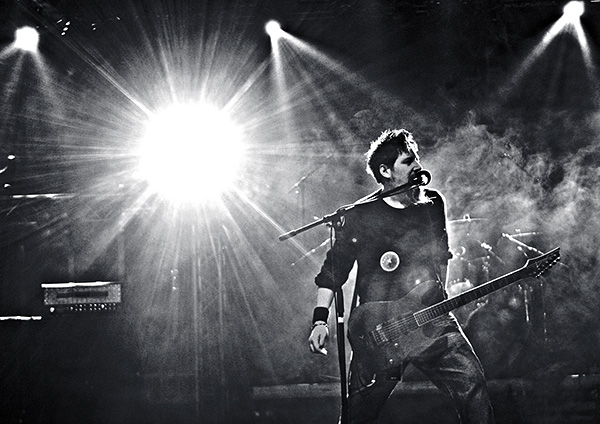
There are very few artists that have achieved such unique and immediately identifiable tones. The guitar tone, too—especially on Screams and Whispers, like the intro to "Tools of Separation"—I'm not a gearhead by any stretch, but how the hell did you stumble upon that guitar tone!? The way that unusual, smoldering distortion works with the colder atmospheres of the bass is so killer.
Well, we did everything wrong during our seven years together, but by the time we were on the last album, we had switched back to using natural tube distortion, which has a less static tone and is warmer. The sound I use today is similar, though I use only a pedalboard now. The hard thing about our music is that I have been tuning all the way down to B since the mid-'80s, and things get lost in the mud if you aren't careful. I try to find a middle ground between full, deep, fat chords and clarity to actually hear the notes and riffs.
After the breakup of Anacrusis, you got into computer programming of some sort and turned that into a career. How did that come about, and did you ever experience any bitterness over dealing with a "real job" as opposed to the full-time pursuit of your artistic endeavors?
Yeah, but playing music can be a real pain as well. You have to make a living to be able to have the opportunity to do the other things in life you enjoy. Some people are lucky enough to earn a living doing what they love, but not many. I still find time to write and record and play around with music. I'd probably be much more miserable if music was my full-time "job."
For years now, you've made a ton of music freely available via the Anacrusis website—a move which is both atypical and very cool. What's your perspective on piracy, streaming music services, etc. and how they impact the financial stability of musicians?
It's a difficult question to answer. I think it has ultimately destroyed the music business almost entirely, with a few exceptions. There is very little money to be made from recording and releasing albums for the majority of people out there today, and it would be silly to attribute that to any other reason aside from the obvious. Most people have been getting it for free for many years now. Most people are only as honest as they have to be, I think. We've all downloaded something (if we know how). Having everything right there, just a couple clicks away, can almost make you feel like a fool going and paying for it. Everyone makes excuses and justifies what they do. On the other hand, I think the diehard fans are loyal and will always support the bands they truly love. It is everyone else out there that may not, and judging by album sales—even of the biggest bands—most clearly are not buying music. I don't think anyone has stopped listening to it, though, so do the math.
Our stuff was out of print for many years, which is why I put everything up for free. I think it really helped keep our name alive so many years later. It seems like about half the Anacrusis fans I come in contact with got into the band after we had broken up, and I think making that music available helps us in that respect.
Speaking of the website, what's your motivation behind that? I can't think of any other band that has done something so great as to offer such an extensive archive of background information on various recording sessions, alternate takes, unreleased demos, and so on. (I certainly wish more bands would follow your lead!)
Well, a fan years ago had written some very favorable stuff reviewing our albums on his website. I knew from what he had written that he was really into our music and knew a lot about the band. I contacted him and let him know that if he needed any info, pictures, etc. to let me know. He then said he had intended to write up sort of a tribute page to us, and I agreed to help out. He put together the first version of the site in about 1998, I think. Anacrusis had broken up quietly in the pre-internet age, and many people wondered what had happened to the band then and afterwards.
Over the years, I revamped the site several times, and even though it is very outdated in style, I think there is a lot of good content for fans there. It's really just an archive. With the band inactive, I don't see any point in doing a proper site or maintaining it, since nothing is going on.
As for the content itself, I was always recording rehearsals, demos, and things like that, and several years ago I went through this big box of old cassette tapes and digitized everything. I myself am a big fan of rare recordings and different versions of things and all of that, so I decided to post a lot of that stuff for Anacrusis fans who enjoyed that type of thing as well.

Anacrusis is highly regarded for having developed a truly innovative and intelligent brand of metal that never received its proper due while the band was active. Did that sting at the time? And if so, did the reunion shows and subsequent love from the fans—and what you've now accomplished with Dancing With the Past—sort of "heal the wound," so to speak?
It was very frustrating at the time to get these very good reviews pointing out all of these great things about the band, when at the same time we never felt like the label pushed the band much at all. I don't think they really believed in what we were doing, or that they were all that concerned with us. Playing the reunion shows definitely made us feel like it wasn't a complete waste of time. I think we all feel like Anacrusis is more widely respected now than we were back in the '80s and '90s.
Where does this all leave you in terms of future music? Now that you've proved that you can do this all on your own, at your own pace, are the ideas and inspiration still flowing?
I still have lots of musical ideas that I didn't use for the album, and even some older stuff I wouldn't mind re-recording. I don't know what I will do with this music, whether I will make another album or not, but if I do, it will not be like Dancing With the Past in its scope anyway (as for the volume, that is). I had a lot that I wanted to "say" musically with Dancing With the Past, especially after all these years. If I do record again, it will be a more "normal"-sized album, though probably in a similar style.
One thing I've thought a lot about is playing live, but unfortunately I have no band. I think the material on Dancing With the Past (along with some Anacrusis tunes) would make for a very dynamic show, but I wouldn't know where to begin finding the other musicians to play with. I guess we'll see if there is enough of a demand for this type of thing, but I am open to the idea.
Thanks so much for your time! I have to say that songs like "My Soul's Affliction," "Sound the Alarm," and "What You Became"—to cite but a few—have really stuck with me ever since I was young. It's been cool to chat with you a bit, and it's much appreciated!
I just want to thank everyone for giving Dancing With the Past a chance. I know everyone was hoping for an "Anacrusis" album, but hopefully there is enough of our sound in some of the material to make everyone happy—and enough new stuff to bring in some new fans as well. Either way, the fans have been fantastic in their response to the album, which makes it all worthwhile to me. Hopefully there is enough material there to keep them occupied for quite a while.

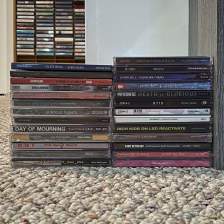
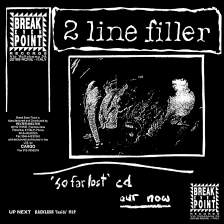
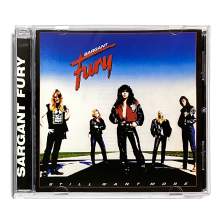
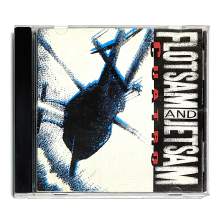
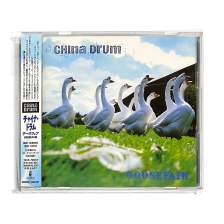
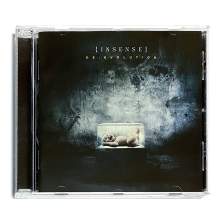
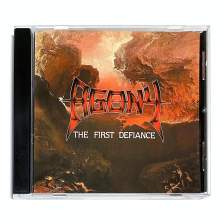
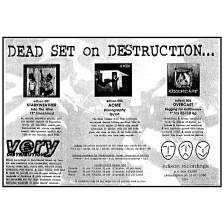

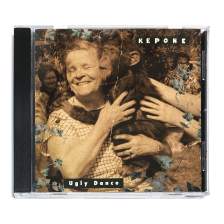
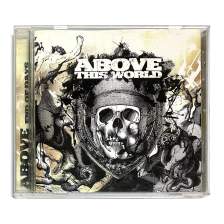
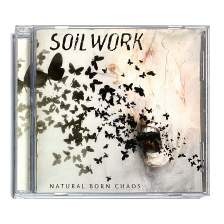
Comments
Great piece, Andrew. Anacrusis is criminally underrated. Always ahead of the curve. One could think too far ahead for their own good as it probably facilitated the fast-track to obscurity and later interest. Would agree the solo material Nardi has produced retains some of the signature Anacrusis style and pushes his forward thinking approach to sound.
2.17.2015 | By kidlazarus